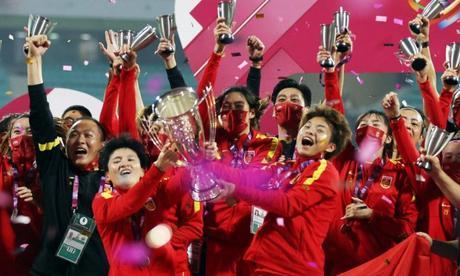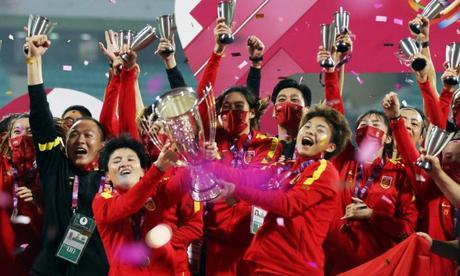Photo: James Elsby/AP
Sports history is littered with Sliding Doors moments, moments when future fortunes depend on one swing of a bat, one throw of a ball or one swipe of a boot.
Named for the 1998 film in which alternate realities from Gwyneth Paltrow's life simultaneously unfold and diverge at the point when she did or did not board a subway train, the most consequential example of a Sliding Doors moment in women's soccer history took place on July 10, 1999 at the Rose Bowl in Pasadena, California.
After 120 goalless minutes, preceded by nine-tenths of the ensuing penalty shootout, Brandi Chastain steadied herself. United States goalkeeper Briana Scurry had saved Liu Ying's attempt. Everyone else had scored. If Chastain in turn converted from 12 yards, the US women's national team would become world champions for the second time. Chastain hit her left shot high into the corner of the net. Then, in a snap that appeared on the front pages of Newsweek, Sports Illustrated and countless newspapers the next day, she took off her jersey and fell to her knees as 90,000 fans exploded in jubilant celebration.


In no time, women's soccer was catapulted into the American sports consciousness. The USWNT, having won its first World Cup in 1991, would claim two more titles over the next twenty years.
An opposite trajectory was followed for the defeated 1999 finalists, China. As they prepare to face the US for a double-header of friendlies starting Saturday, the Chinese women's national team are only now showing signs of escaping their post-Pasadena doldrums.
The Steel Roses had built momentum leading up to the '99 finals. They hosted the first World Cup in '91, finished fourth at the next edition four years later and won a silver medal at the 1996 Olympics, where the US had won gold on home soil. They had also won the Asian Cup seven times in a row and looked fearsome in the earlier rounds of the 1999 World Cup - three wins from three in the group stage, with 12 goals scored and just two conceded, followed by a 2-0 quarter. -final victory over Russia and a 5-0 thrashing of Norway in the semi-finals.
The story continues
The initial reaction to the narrow defeat of '99 was one of anger at their opponents. The Chinese media protested that Scurry had crawled forward from her goal line to save Liu Ying's penalty. "Everyone does it," was the American goalkeeper's response to the allegation. But then interest - and more importantly, funding - in the Chinese women's game waned. There was a stark illustration of how China was being overshadowed as a power in the region when Japan became the first Asian country to win the Women's World Cup in 2011, a tournament for which China failed to qualify.
Meanwhile, the Steel Roses had to watch as the men's team was prioritized for funding and infrastructure development. In 2015, Chinese leader Xi Jinping, a self-proclaimed soccer fan, came up with a plan to pump money into the men's game in a bid to turn the world's most populous country into a soccer powerhouse. It did not work. The Chinese men's team still ranks a lowly 79th in the world and has made just one World Cup appearance, in 2002. Many administrators of the men's game have fallen foul of the country's anti-corruption and domestic league enforcement has shrunk due to declining investments.


More recently, the Chinese women's team has begun something of a resurgence. Last year they won their first Asian Cup title since 2006 and in March this year they rose to 13th in the FIFA world rankings, equaling the highest mark in the past fifteen years. The fact that the Steel Roses squad for the 2023 World Cup included a record six players based outside China suggests a growing quality of players being produced by a once isolated footballing nation.
China entered the World Cup in Australia and New Zealand last summer with the aim of reaching the quarter-finals, a level they last reached in 2015 when they were eliminated by the United States. But they fell short and exited the group stage after a 6-1 thrashing of eventual runners-up England. Since then, they have fallen to 15th in the world rankings. They have not been in the Top 10 since 2006.
Twenty-four years after the World Cup final victory that laid the foundation for two decades of domination, the USWNT has reached its own pivotal moment. Emma Hayes will take charge of the US women's national team when her contract with Chelsea expires next year. The Englishwoman's appointment coincides with a period of rare uncertainty for the USWNT, coming off the back of a last-16 exit at the World Cup - their worst ever performance at the tournament - and with pillars of past success such as Megan Rapinoe, Julie Ertz and Ali Krieger are retired.
Whether or not the U.S. can regain its position at the top of women's soccer will depend on Hayes' stewardship of a squad centered around a new generation of developing stars like Sophia Smith and Trinity Rodman. "I know there is work to be done to achieve our goals of winning consistently at the highest level," Hayes said in announcing her appointment. "Getting there will take dedication, commitment and cooperation from the players, the staff and everyone at the U.S. Soccer Federation."
Those within the governing body of Chinese women's football are now planning greater success in the 2030s. Along with upgrades to infrastructure and talent identification processes, a plan announced last October outlined a target to achieve top three finishes at the World Cup and Olympics by the start of the next decade.
"Women's soccer is the place where they can build hopes and dreams," Tom Byer, a youth soccer development consultant who has worked with the Chinese government to develop grassroots training programs, told the Wall Street Journal. "It's a way to take the pressure off and focus on the failures of the past years."
A few positive results against the USA this winter would finally be a first step toward driving the ghosts out of Pasadena and prying open its doors.
